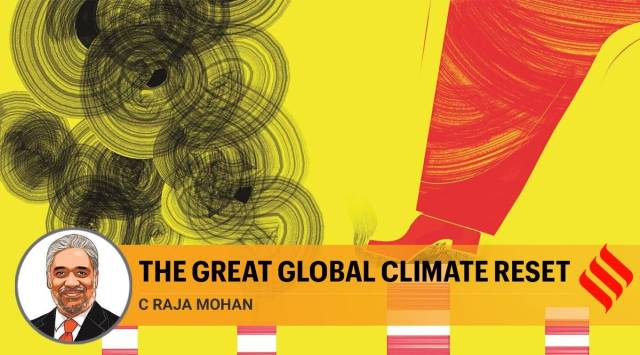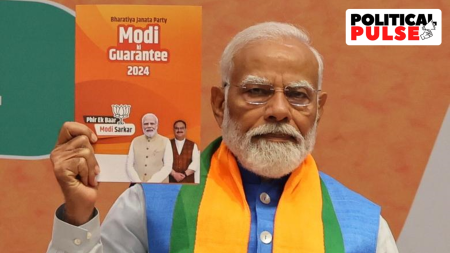- India
- International
Delhi’s real test on climate change is on building political consensus to adapt to changed reality
Despite contrasting approaches, China and US share goals on environment. In underlining climate change as an important area of engagement with Biden, Delhi has signalled its readiness to deal with a new phase in the global politics of environment.
 Biden has promised to deploy the full range of foreign policy tools — including new tariffs and potential sanctions — to build a vigorous new global regime on mitigating climate change. (Illustration by C R Sasikumar)
Biden has promised to deploy the full range of foreign policy tools — including new tariffs and potential sanctions — to build a vigorous new global regime on mitigating climate change. (Illustration by C R Sasikumar)The question of penalising stubble burning that chokes the cities of north-western India during the early winter months is only one of the issues in the larger argument between the NDA government and the Punjab farmers. But the question of developing and enforcing new environmental norms is not limited to India.
Our focus here is on China and the US — the world’s two largest economies. China’s vigorous pursuit of “ecological civilisation” under President Xi Jinping and president-elect Joe Biden’s promise to put climate issues at the heart of US domestic and foreign policies are set to transform the terms of the global discourse on environment. At least some goalposts of the climate debate that we have known are likely to move, and quite soon.
Delhi is probably better prepared than in the past when India was widely seen as part of the problem on climate issues. Delhi is no longer defensive on climate change and is actively engaged in shaping the international debate. But the urgency of addressing climate change is likely to intensify in the immediate term with the election of Biden as US President and the prospect of cooperation on climate change between Washington and Beijing.
The new direction of Chinese and US policies (in partnership with Europe and Japan) will inevitably put pressure on other states to reorganise their energy production and consumption, restructure economies, adopt new technologies, and manage the internal political backlash against the costs that are likely to be distributed unevenly among nations and the class hierarchies within them.
India’s ability to influence the new geopolitics of climate change will depend a lot on its domestic political resilience in adapting to the new imperatives. While a democratic India struggles to deal with the new internal conflicts centred on climate, China has crafted a new template of “coercive environmentalism”. Until the early 21st century, China was the prime example of putting growth and development above considerations of ecological sustainability. This has dramatically changed in recent years as China moved decisively in addressing many challenges of climate change. President Xi’s predecessor, Hu Jintao, had identified the construction of a “harmonious society” as a major objective of the Chinese Communist Party. Resolving the tension between development and environment was very much part of building a harmonious society in China.

As the scale of the challenge at the national and global levels became clear, the CCP reframed the problem as bringing harmony between humanity and nature and the building of an “ecological civilisation”. The CCP’s formulation that the objectives of a modern ecological civilisation are in harmony with ancient Chinese culture helped give the pursuit of new climate objectives a stronger political sanction.
Once he took charge from Hu in 2012, Xi brought his own distinctive brand of governance to the building of an ecological civilisation. His decision to strengthen the party-state against the rest of society, curb dissent, and impose tough and unconventional solutions for the problems confronting China had its expression in the environmental policy.
Xi’s vigorous mobilisation of state power to enforce new environmental norms in the last few years has helped China shed the image of being the “bad boy” on climate issues. China’s ecological activism has been hailed or derided as the model for “authoritarian environmentalism”. For proponents, Xi’s coercive strategy has been more effective than the “liberal environmentalism” of democracies that find it hard to generate political consensus on the necessity for action or the nature of it.
Critics do concede the effectiveness of some of China’s coercive strategies, but also point to massive political and social costs of China’s ecological authoritarianism — the suffering of local communities arising from top-down solutions, and the tendency of the CCP’s technocratic elites to make major mistakes in assessing and treating environmental problems.
But the Chinese model of coercive environmentalism is finding an echo among some Western environmentalists. They believe planetary survival must be the foremost objective of the moment and all other considerations must be subordinated to it. Whatever the merits of authoritarian environmentalism, it has little political chance of being replicated in democracies. Plural societies are focused on improving the nature of liberal environmentalism that relies on political consensus in drafting new environmental norms and their effective enforcement as well as the reliance on market-based mechanisms.
Modernising liberal environmentalism is indeed the essence of president-elect Biden’s commitment to integrating the climate question with the domestic policy agenda. Biden plans to enforce environmental regulations that were either diluted or discarded by the Donald Trump administration and enhance the incentives for polluters to compensate for their violation of norms. “Climate justice” is another important objective of Biden’s domestic environmental policy. It is based on the recognition that pollution and other ecological problems have a greater impact on the poor and minorities.
Although coercive and liberal approaches to managing climate change are poles apart, they share some important objectives. Both China and the US (along with the West) recognise the urgency of the challenge. Beijing and Washington are also racing to develop new technologies that will constitute the foundations of the green economic future. Both have zeroed in on industrial policy to achieve their climate objectives. For Xi and Biden, gaining the leadership of the global movement for mitigating climate change is a strategic mission. Washington and Beijing understand that climate politics is in the end about rearranging the global order.
Biden is looking beyond rejoining the Paris Accord to set accelerated timelines for reducing carbon emissions. There will be a special focus on an early end to the worldwide use of coal. The appointment of a cabinet-level special envoy on climate change and the choice of former secretary of state John Kerry for the job underlines the seriousness of the intent of the Biden team.
Biden has promised to deploy the full range of foreign policy tools — including new tariffs and potential sanctions — to build a vigorous new global regime on mitigating climate change. Europe, which is relieved to see the US return to climate activism, is all set to support such initiatives. On his part, Xi has signalled China’s willingness to undertake additional commitments on carbon emissions than the ones made at Paris and an eagerness to work with Biden on climate change. At a moment of deepening conflict with the US, cooperation on climate change offers an important lever for Beijing in engaging Washington.
In underlining climate change as an important area of engagement with Biden, Delhi has signalled its readiness to deal with a new phase in the global politics of environment. But diplomacy can only win time and space for India’s internal adjustment to the new imperatives. Delhi’s real test on climate change is on building a new domestic consensus that can address the economic and political costs associated with an internal adjustment to the prospect of a great global reset.
This article first appeared in the print edition on December 8, 2020 under the title ‘The great global climate reset’. The writer is director, Institute of South Asian Studies, National University of Singapore and contributing editor on international affairs for The Indian Express
40 Years Ago
EXPRESS OPINION
More Explained
Apr 16: Latest News
- 01
- 02
- 03
- 04
- 05









































